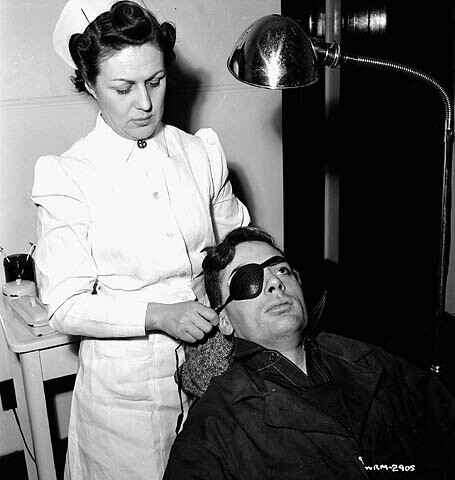Caregiver: (n) a person who cares for someone who is sick or disabed. (Dictionary.com)
Photo Credit: Ronny Jaques. National Film Board of Canada. Photothèque. Library and Archives Canada
Yes, I fit in this category. But, I purposely do not use this word to define my relationship with S. I use a lot of words to define my role, but not this one. I feel it adds a sense of superiority and resentment to my side of the relationship. One spouse feeling superior to another in a relationship spells the doom of the relationship. Unless you've just won a really good argument. But, that sense of superiority will go away at the next argument. Anyway, S and I are equals. Neither one of us are superior (no matter what he tells you!).
The resentment is discussed in any caregiver website you look at or book you pick up. The article listing at Caregiver.com includes articles such as:
- A Silent Crisis: Working Caregivers Are Begging For Help
- Caregiver Burnout
- Depression in the Caregiver
- Caring For The Caregiver
- Give Yourself a Break
- Managing Caregiver Guilt
- Respite Care Spells Relief for Stressed Out Caregivers
- When and How To Say "No" to Caregiving
I've worked in the social services field for a long time before having my kids and maybe that is what colors my perception. No matter what job I had, I was told at the onset not to expect it to be a life long career. "You will get burned out," they told me.
Well, I plan on being with S for at least another 30 to 40 years. I can't afford to get burned out. So, instead of defining us as caregiver and caregetter, I simply say our roles have changed and I focus on what he can do, rather than what he cannot do.
Does resentment still rear its ugly head? Hell, yeah, I'm not perfect. Since his first surgery, I have taken on more and more responsibilities. Things that he used to do without thinking -- mow the lawn, move furniture, clean out the dryer vent -- are now up to me. Plus, the inevitable ups and downs are incredibly frustrating. One day he has no problem caring for our 1 year old child. The next day he can barely stand to get a shower. Even though I understand this is the nature of both his diseases, I get tired and angry and resentful.
But, then I remember that I got angry and resentful even before he was disabled. And, he got angry and resentful with me. Doesn't every spouse have feelings like that once in awhile? These feelings are temporary and will go away.
I also remember that I'm not really angry with him. I'm more or less angry with the disease. S would rather help mow the lawn and play with the kids, than lay on the couch in constant pain. It's really hard to remain angry at something that can't fight back, so I let it go.
This is why you will rarely see me use the word "caregiver" on this site, unless I'm discussing someone else's ideas. I am my children's caregiver, not my partner's.

No comments:
Post a Comment